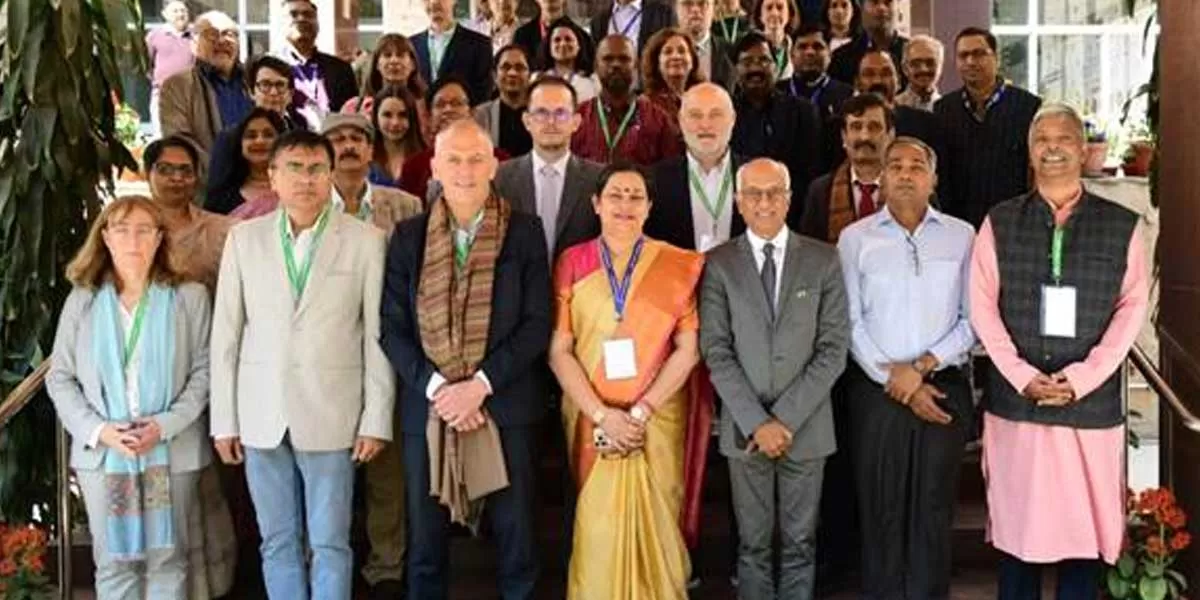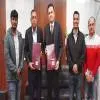The CSIR-National Institute of Science Communication and Policy Research (CSIR-NIScPR), New Delhi, in collaboration with the CNRS-Department for Open Research Data, Open Science, Publications, Research Data, and High-Performance Computing (CNRS-DDOR), Paris, successfully hosted a two-day Indo-French Seminar on “Open Horizons: Integrating Open Access, Open Data, and Computational Innovation”. The seminar, held on 5-6 March 2025 at CSIR-NIScPR, Satsang Vihar Campus, New Delhi, brought together leading researchers, scientists, and policymakers from India and France to deliberate on the transformative potential of open access, open data, and digital technologies in advancing scientific collaboration and innovation.
A Step Towards Global Scientific Cooperation
The seminar served as a crucial platform for India and France to explore strategies for integrating open access, open data, and open-source platforms to enhance transparency, promote scientific collaboration, and strengthen the link between science and society. Discussions revolved around the pivotal role of digital technologies in fostering an information-driven approach that benefits researchers, policymakers, and the global scientific community.
The event was inaugurated in the presence of eminent dignitaries, including Dr. Antoine Petit, Chairman and CEO of CNRS, France; Prof. Ranjana Aggarwal, Director of CSIR-NIScPR; Prof. Nitin Seth, Director of CEFIPRA; and Dr. Srinivasa Reddy, Director of CSIR-IICT.
In her inaugural address, Prof. Ranjana Aggarwal highlighted the significance of open science in democratising knowledge dissemination. “This seminar marks a critical milestone in fostering international partnerships and advancing the principles of open science for the greater good of society,” she remarked, also underscoring the Indian Government’s ‘One Nation, One Subscription’ initiative aimed at broadening access to research publications.
Prof. Nitin Seth traced the evolution of Indo-French collaborations in science and technology, emphasising the growing partnerships between the two nations. Meanwhile, Dr. Srinivasa Reddy stressed the value of open access in accelerating scientific progress, drawing on past collaborations between CSIR-IICT and CEFIPRA.
Dr. Antoine Petit and Dr. Sylvie Rousset from CNRS-DDOR shared insights into CNRS’s initiatives in open research data, advocating for the integration of open-access practices across scientific domains. Dr. Kasturi Mandal (CSIR-NIScPR) and Dr. Rousset outlined the key themes of the seminar, setting the stage for discussions on policies, challenges, and opportunities in open science.
Key Discussions: Open Science, Policy, and Computational Innovation
The seminar featured multiple thematic sessions, each addressing different aspects of open science and research collaboration:
Session on Open Access Policies in France and India: Chaired by Prof. Vivek Kumar Singh (NITI Aayog), the session explored national policies driving open access. Dr. Marin Dacos (French Ministry of Higher Education and Research) highlighted France’s policies promoting academic efficiency, reproducibility, and citation impact. Dr. Remya Haridasan (PSA Office, Government of India) elaborated on the ‘One Nation, One Subscription’ initiative, discussing its implementation challenges and impact on research accessibility.
Session on Open Access Pathways: Chaired by Prof. Anirban Chakraborti (JNU), the session featured insights from Dr. Bénédicte Kuntziger (CCSD, CNRS) on France’s HAL open-access repository. Dr. Françoise Rousseau (Couperin Consortium) discussed strategies for negotiating with scientific publishers, while Dr. Subbiah Arunachalam (DST-CPR, IISc) and Dr. Geetha Vani Rayasam (CSIR-HRDG) examined India’s progress in open access and its role in drug discovery research.
Panel on Open Access Diversity: Chaired by Dr. Laurence El Khouri (CNRS-DDOR), this session explored global open-access models. Dr. Lidia Borrell-Damian (Science Europe) presented the Diamond Action Plan, advocating for a collaborative ecosystem. Prof. Rajeswari Raina (Shiv Nadar University) urged stakeholders to adopt a global perspective on open access.
R&D in Computational Innovation and Open-Source Software: Chaired by Dr. Avinash Kshitij (CSIR-NIScPR), this session covered the role of computational tools in research advancement. Prof. Roberto Di Cosmo (INRIA) introduced the Software Heritage initiative, while speakers from Delhi Technological University, ICAR, and NIC highlighted the importance of data standardisation in agriculture and computational innovation in government research initiatives.
Reforming Research Evaluation: Speakers, including Dr. Lidia Borrell-Damian (Science Europe) and Dr. Moumita Koley (IISc), deliberated on modernising research assessment methodologies to foster innovation and efficiency in scientific evaluation.
Open Data Sharing and Future Prospects: Discussions revolved around the importance of data-sharing ecosystems, with presentations from Ms. Alka Misra (NIC), Dr. Marin Dacos (French Ministry of Higher Education and Research), and Dr. Naresh Kumar (CSIR-NIScPR).
The seminar concluded with a high-level panel discussion on the Future of Open Science, Open Data, and Open Source, featuring experts from CSIR, CNRS, Tata Memorial Hospital, and other institutions.
A Promising Future for Open Science
The Indo-French seminar underscored the growing emphasis on open science as a catalyst for research accessibility, collaboration, and innovation. As nations increasingly embrace open-access policies, the scientific community stands to benefit from enhanced knowledge-sharing, improved research reproducibility, and stronger global networks.
India and France, through their sustained partnerships in science and technology, continue to set a precedent for international cooperation in open research. With initiatives like ‘One Nation, One Subscription’ and France’s HAL repository, both countries are paving the way for a future where scientific discoveries are freely accessible to all.
As the landscape of research continues to evolve, integrating open-access principles with digital innovations and policy reforms will be crucial in shaping a more inclusive and dynamic global scientific ecosystem.




















